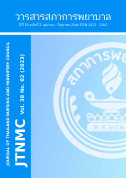Effects of a Community-Based Learning in Community Health Nursing Process on the Community Health Management Competency in Nursing Students
DOI:
https://doi.org/10.60099/jtnmc.v38i02.261425Keywords:
community health nursing process, community-based learning, community health management competencyAbstract
Introduction Community-Based Learning is a teaching strategy that focuses on students’ ability to respond effectively to real-life community situations. This learning approach aims to improve nursing students’ knowledge, skills, and attitudes, helping them develop their community health management competencies.
Objective To compare nursing students’ community health management competencies at baseline, post-lecture and after program completion.
Design This study employs a quasi-experimental design with one-group repeated measures
Methodology Through purposive sampling, the sample consisted of 141 second-year nursing students from a nursing college, Phra Boromrajchanok Institute. Based on Kolb’s Learning theory, the Community-Based Learning approach in Community Health Nursing Process included five activities: 1) learning the community nursing process theory, 2) visiting the community area, 3) reflection, 4) summarizing the learning content, and 5) applying knowledge. The program was validated by content experts. Data were collected at baseline, post-lecture and after program completion using an assessment of community health management competency, which included three main competencies: 1) Community health management knowledge, 2) Community health management skills, and 3) Community health management attitude. The Cronbach Alpha coefficient was .97. Data were analyzed using descriptive statistics and One-way ANOVA with repeated measures.
Results After the program, the sample had higher community health management competencies (M = 4.48, SD = 0.62) compared to post-lecture (M = 3.63, SD = 0.49) and the baseline (M = 3.56, SD = 0.67), with statistical significance (F = 170.783, p < .001). However, no significant difference was found when comparing competencies at baseline and post-lecture.
Recommendation The community-based learning approach was effectively enhanced community health management competencies of nursing students and can be applied to other community-related subjects, such as family health care, school health, occupational health, and environmental health.
Downloads
References
Thongtanunam Y, Charoensuk S. Community Health Management Competencies of Nursing Graduates: Concept for a Development. Journal of Research and Curriculum Development. 2021;11(2):24-34. (in Thai)
Cheng YC, Huang LC, Yang CH, Chang HC. Experiential Learning Program to Strengthen Self-Reflection and Critical Thinking in Freshmen Nursing Students during COVID-19: A Quasi-Experimental Study. Int J Environ Res Public Health. 2020 Jul 28;17(15):5442. doi: 10.3390/ijerph17155442. PMID: 32731648; PMCID: PMC7432080
Hill B. Research into experiential learning in nurse education. Br J Nurs. 2017 Sep 7;26(16):932- 38. doi: 10.12968/bjon.2017.26.16.932. PMID: 28880621.
Rittikoop W. Community-Based Learning: Effective Pedagogy Strategies for Teachers in the 21st Century. Graduate School Journal. 2018;11(3):179-91.
Prontadavit N. Development of Active Learning in Learning Management Subject. Rajamangala University of Technology Krungthep Research Journal.. 2017;11(1):85-94. (in Thai)
Thai Health Promotion Foundation. Nursing competency development course for community health manager. 1st. Bangkok: Ministry of Public Health; 2014
Kolb DA. Experiential learning theory and the learning style inventory: A reply to freedman and Stumpf. Acad Manage Rev [Internet]. 1981;6(2):289. Available from: http://www.jstor.org/stable/257885
Li C, Yang Y, Jing Y. Formulation of teaching strategies for graduation internship based on the experiential learning styles of nursing undergraduates: a non-randomized controlled trial. BMC Nursing. 2022. DOI: https://doi. org/10.1186/s12909-022-03221-0.
Patcheep K, Wongsawang N, Jongphae S, Boonsiri C. Competences of Community Health Care Management among Nursing Students of Boromarajonani College of Nursing, Ratchaburi. J Royal Thai Army Nurses [Internet]. 2021 Apr. 26 [cited 2022 May10];22(1): 450-7. Available from: https://he01.tci-thaijo.org/index.php/JRTAN/article/view/240022 (in Thai)
Plichta, S. B., Kelvin, E. A., Munro, B. H. Statistical methods for health care research. 6th edition. Philadelphia: Wolters Kluwer Health/ Lippincott Williams & Wilkin; 2013.
Prathumtone V, Chenchob P, Rasiri S , Teinkaw S, Teerapong N. Development of an Interprofessional Education Learning Model for Health Promotion and Disease Prevention, Using the Community-Based Approach. SCNJ. 2020;7(2):179-93. Available from: https://he01.tci-thaijo.org/index.php/scnet/article/view/240710
Jensantikul N. Community-Based Learning Process : Reflections on Experience and Learning. jhsmbuisc [Internet]. 2021 Dec. 30 [cited 2022 May 10];2(3):78-85. Available from: https://so06.tci-thaijo.org/index.php/jhsmbuisc/article/view/253640. (in Thai)
Guo-Brennan L, VanLeeuwen C, Macphee MM, Guo-Brennan M. Community-Based Learning for International Graduate Students: Impact and Implications. MJCSL 2020; 26(2):39-70. doi. org/10.3998/mjcsloa.3239521.0026.203.
Nuuyoma V, Munangatire T, Nghiweni N. Nursing students’ experiences of community-based learning in an undergraduate programme at a Namibian University. IJANS. 2022;17:1-7. doi. org/10.1016/j.ijans.2022. 100458.
Meenakhet P, Sihawong S. The Effect of Community-Based Teaching and Learning Management on the Use of Courseville in Health Promotion to Enhance the 21st Century Learning Skills of Nursing Students. The Journal of B a r o m a r a j o n a n i C o l l e g e o f N u s i n g , Nakhonratchasima. 2019;25(1):74-87. (in Thai)
Murray R. An Overview of Experiential Learning in Nursing Education. ASSRJ [Internet]. 2018 Jan.26 [cited 2022 May11];5(1). Available from: https://journals.scholarpublishing.org/index.php/ASSRJ/article/view/4102
Zeydani A, Atashzadeh-Shoorideh F, Abdi F, Hosseini M, Zohari-Anboohi S, Skerrett V. Effect of community-based education on undergraduate nursing students’ skills: a systematic review. BMC Nurs. 2021 Nov 18;20(1):233. doi: 10.1186/ s12912-021-00755-4. PMID: 34794436; PMCID: PMC8600777.
Piwpong R , Chaiwong N , Bunmee P, Khongruangrat Y, Hormneam N, Sonwicha S. A Development of a Community-based Learning Model in the Geriatric Nursing and Adult and Geriatric Nursing Practice I to Promote 21st Century Nursing Students’ Learning. Journal of Boromarajonani College of Nursing, Surin. 2022;12(1):16-31. (in Thai)
Buachu T. A Study of the Opinion of Teaching and Learning Models of undergraduate Nursing Curriculum, Phetchaburi Rajabhat University in the 21st Century. Journal of Nursing Science Chulalongkorn University. 2018;30(3):26-37. (in Thai)
Melaville A, Berg AC, Blank MJ. Community-based learning: Engaging students for success and citizenship. Coalition for Communit Schools [Internet]. 2006 [cited 2022 March 20]; Available from: http://files.eric.ed.gov/fulltext/ED491639.pdf
Downloads
Published
How to Cite
Issue
Section
License
Copyright (c) 2023 The Journal of Thailand Nursing and Midwifery Council

This work is licensed under a Creative Commons Attribution-NonCommercial-NoDerivatives 4.0 International License.








